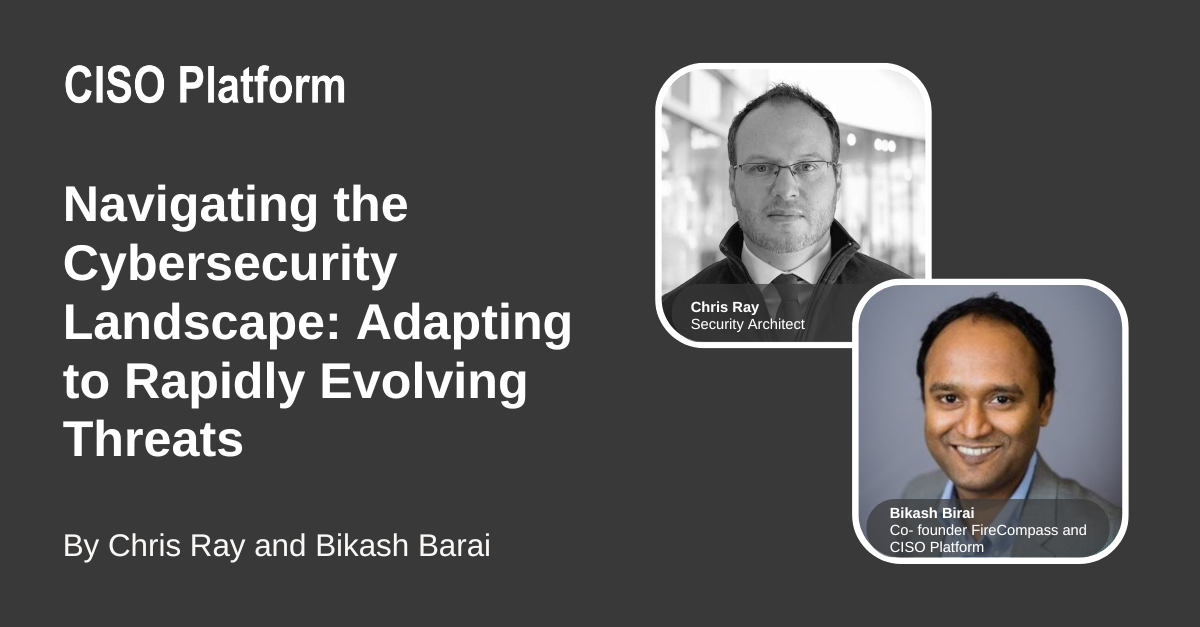In an age where digital connectivity pervades every aspect of our lives, cybersecurity has emerged as a critical concern. The rapid evolution of technology has brought about unprecedented opportunities, but it has also opened doors to a myriad of vulnerabilities. Today, attackers wield sophisticated tools and techniques, exploiting weaknesses in systems with alarming efficiency. To navigate this landscape, organizations must remain vigilant, adaptive, and proactive in their approach to cybersecurity.
Here is the verbatim discussion:
Unlike earlier today they can like scan the entire internet in a day and and find out vulnerable systems try to exploit so we got to be fast as well and then organizations as you mentioned don't know all the assets they have a lot of things are happening behind the back because of the decentralized power right like people want to go agile they you have like organ different departments making decisions on their own fast so that also creates a lot of things happening I never thought of you know showdan you're right has been around a long time showan is is the search engine for iot that's what it was called I don't know if it's still called that but essentially you know if you're not familiar with showan it's like Google but for Internet connected stuff Cloud resources webcams security cameras whatever ends up on the Internet ends up in showed in and it fingerprints it it looks to identify what type of service maybe manufacturer what operating systems Etc and you can go there and you can look for specific versions of os Hardware uh applications that you know are vulnerable these are kind of connected so let me summarize like one one of the things which we discussed about so far is the attackers are attacking everybody on the internet I mean these attacks are becoming democratize especially with the ransom guys attacks have become lot faster right I mean unlike earlier today they can like scan the entire internet in a day and and find out vulnerable systems try to exploit so we got to be fast as well and then organizations as you mentioned don't know all the assets they have. A lot of things are happening behind the back because of the decentralized power. Right?
Highlights:
The Shifting Paradigm of Cyber Threats: As discussed in the clips, the nature of cyber threats has undergone a significant transformation. Attackers no longer discriminate based on size or industry; everyone connected to the internet is a potential target. Moreover, the democratization of cyber attacks, particularly with the rise of ransomware, has accelerated their pace and scale.
The Role of Decentralization: Decentralization, often touted for its benefits in promoting agility and innovation, also introduces complexities in cybersecurity. With power dispersed across various departments and individuals within organizations, it becomes challenging to maintain a comprehensive view of all assets and vulnerabilities. This lack of visibility creates opportunities for malicious actors to operate undetected.
The Power of Tools like Shodan: Tools like Shodan exemplify the vast landscape of cyber threat intelligence. Dubbed the "search engine for the Internet of Things (IoT)," Shodan scans and indexes internet-connected devices, providing invaluable insights into potential security risks. By leveraging such tools, security professionals can proactively identify and mitigate vulnerabilities before they are exploited.
As cyber threats continue to evolve in sophistication and scale, the need for robust cybersecurity measures has never been more pressing. Organizations must adopt a multi-faceted approach that combines advanced technologies, proactive monitoring, and a culture of security awareness. By staying informed, vigilant, and collaborative, we can collectively safeguard our digital ecosystems against emerging threats, ensuring a secure and resilient future for all.
Speakers:
Chris Ray, a seasoned professional in the cybersecurity field, brings a wealth of experience from small teams to large financial institutions, as well as industries such as healthcare, financials, and tech. He has acquired an extensive amount of experience advising and consulting with security vendors, helping them find product-market fit as well as deliver cyber security services.
Bikash Barai is credited for several innovations in the domain of Network Security and Anti-Spam Technologies and has multiple patents in USPTO. Fortune recognized Bikash among India’s Top 40 Business Leaders under the age of 40 (Fortune 40-under-40).Bikash is also an active speaker and has spoken at various forums like TiE, RSA Conference USA, TEDx etc.
Earlier he founded iViZ an IDG Ventures-backed company that was later acquired by Cigital and now Synopsys. iViZ was the first company in the world to take Ethical Hacking (or Penetration Testing) to
the cloud.


Comments